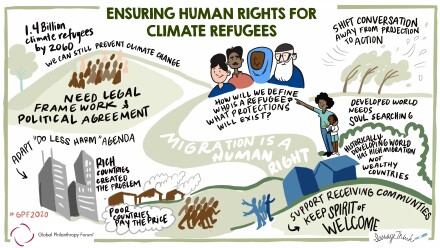Day two of the conference featured leaders, change-makers, and experts from across the globe who discussed how we can build resilience by promoting and empowering those who have been disproportionately impacted by climate change.
Former President of Ireland and United Nations High Commissioner for Human Rights, Mary Robinson opened the first session of the day with Wanjira Mathai, vice president and regional director for Africa at the World Resources Institute. They discussed the importance of working with and supporting urbanizing regions to build a more resilient and environmentally just future. Africa is the fastest urbanizing continent in the world with an opportunity to build green cities and sustainable systems, but “engagement with Africa has been inauthentic,” argued Mathai. The top-down approach that has been used historically by industrialized nations has only discredited and undermined the continent’s ability to build and grow. Former President Robinson agrees and urges our political leaders to foster real partnerships with the continent of Africa. Only then can environmentally sustainable progress be made.
“Climate disasters have a disproportionate impact on those who already suffer the greatest inequities in society,” explained Michelle Nunn, President and CEO of CARE USA. Every societal issue we experience today, from racial and gender inequality, to climate change, and poverty—only compound one another; and women and girls tend to suffer the most. Nunn asserted, “We have a moral obligation, and we have a practical imperative to equip the frontline activists… the women… and to really ensure we’re taking an intersectional approach” to climate change and equality. Philanthropists need to take what they learn from this conference and turn it into meaningful investment and action.
Expanding on the idea that we must work with those most adversely affected by climate change, Maxine Burkett, co-founder & senior advisor of The Institute for Climate and Peace and Amali Tower, founder & executive director of Climate Refugees discussed how to protect the rights of those displaced by climate crises. These people are falling through the cracks legally, and will continue to do so at exponential rates as environmental disasters get worse. They’re not classically defined refugees, but are fleeing the destruction of their homes and ancestral lands. We need political commitment to legally protect those forced from their home by global warming, and we need to support countries who will likely receive them.

Plenary sessions were broken up by a mid-conference working group where conference attendees debated various climate-related topics. One of today’s groups discussed how we can expand the pipeline for next generation talent to solve climate change. The conversation focused on how to harness future leaders through science research competitions. Competition is an opportunity to foster innovation and excite high school and university students to approach challenges posed by climate change in new and innovative ways. Two alumnus of the global science competition explained how they and their peers have applied skills they acquired from these youth competitions to form new enterprises.
Throughout the day, we heard about the challenge of facing widespread hesitation in our global society when talking about addressing climate change. Rajiv Shah, president of the Rockefeller Foundation, echoed this concern, explaining that “we don’t have the politics that enables and calls for bold collective actions. That is really what we need at this level in order to recover to have equity, justice, and fairness, and forward-looking behavior.” Philanthropy can do more by inspiring partnership and collective action, and of course, by reminding people that we are all in this together.
A refreshing conversation with youth climate activists Vanessa Nakate and Isha Clarke rounded out day two. They made a strong case for empowering youth activism by giving young people space to be heard. “Climate issues have been sugar coated,” said Nakate, “Youth leadership is important because they speak truth to power…they state the facts as they are.” Clark reminded us that adults got us to where we are now, and things have only gotten worse. “This is our future,” she states. We need young people at the frontline—indigenous, black, queer, trans, differently-abled folks—to get involved and ”rip out” the systems of oppression that are exacerbating climate change and racial injustice.
The best chance we have at combating climate change is to help build resilience in our communities, and we can best do that by fostering authentic partnerships and investing in people who are disproportionately impacted by climate injustice; most notably, women and girls.


